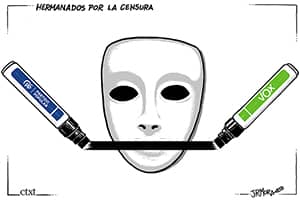
Cartoon from October 2018 by the Colombian cartoonist "Matador" who has faced a couple of legal proceedings for his cartoons.
There has been a lot of talk in Colombia in recent days about the bill to amend Law 599 of 2000, to which twenty new articles were added, including one with this text:
"Anyone who, without the consent of the passive subject, and using technological means, creates images or videos in which the face of another person is simulated, and subsequently disseminates or publishes them or through any information or communication medium or network, with the purpose of obtaining some economic, social or political advantage, shall incur imprisonment of sixteen (16) to one hundred and eight (108) months."
This amendment provoked the reaction of various groups and individuals, including some cartoonists, and a few media outlets published alarming headlines such as these:
"Draft law bans caricatures in Colombia?"(1)
"Alert of a bill that could lead to prison sentences for cartoonists in Colombia"(2)
"9 years in jail for making memes? The law promoted by the Mira party"(3)
"They warn about a bill that could lead to censorship and imprisonment of cartoonists" (4)
"Controversy over Colombian bill proposing to punish creators of memes" (5)
This draft text was supposed to refer, among other things, to "morphing" and the now more than popular "deepfakes".
It was just one more of the proposals to protect minors from cybercrime. Among them was the creation of the "crime of "sexting", consisting of publishing, divulging or revealing images or audiovisual recordings of a person's sexual activity or with sexual content, without their authorisation, on information or communication networks" or also "offering or handing over to a third party images or audiovisual recordings of a person's sexual activity or with sexual content, without their consent".
The danger of possible interpretations
Critics of this article pointed out that the ambiguity of the text regarding the use of images of people's faces without any exceptions would allow a cartoonist to be judged and condemned for drawing a caricature of someone without their consent.
As I understand the fairness of the legal thing, even less of Colombian law and I don't know if there is also the figure of "animus iocandi" and something similar to the right to parody, I have limited myself to reading a whole host of opinions and articles. Some jurists pointed out the danger of a text that is too open. And I agree with them, it is too generic an article that invites possible "happy" interpretations.
In Spain, where we boast of freedoms, caricatures and parodies are not banned either. Although this does not matter because cartoonists, scriptwriters or any other comedian can be sentenced for making a joke about the Bornons that a judge considers insulting due to the generous and open article 491 of the Código Penal, which was drafted exclusively for the Royal House. And surely when it was drafted many thought it would never be used for that.
1. Slander and libel against any of the persons mentioned in the preceding Article (cf. 490), and outside the cases provided for therein, shall be punishable by a fine of four to twenty months.
2. A fine of six to twenty-four months shall be imposed on anyone who uses the image of the King or of the Queen or of any of their ascendants or descendants, or of the Queen consort or the Queen's consort, or of the Regent or of any member of the Regency, or of the Prince or Princess of Asturias, in any way that may damage the prestige of the Crown.
Carlos Eduardo Guevara, president and senator of the MIRA party, came out and said that this is not the purpose of this new point.
El Proyecto NO busca censurar humoristas, ni caricaturistas. Si el texto genera ésta interpretación se corregirá en el debate.
El Objetivo es proteger a los niños de Nuevos Delitos cibernéticos🔝 612%
- Suplantación de identidad: 🔝
409%
-Deepfake,grooming, Ciberbullying y otros https://t.co/VUHSndO3Q8— Carlos Edo Guevara (@carlos_guevara) April 15, 2021
24 hours later, the MIRA party requested the withdrawal of the draft law.
El @PartidoMIRA solicitó retiro del proyecto de ley, cuyo único propósito era la prevención de delitos cibernéticos (sexting, grooming, ciberbullying) que afectan principalmente a menores de edad, debido a múltiples interpretaciones de 1 de 20 artículos que contiene la iniciativa pic.twitter.com/FHBhlN6Sae
— Carlos Edo Guevara (@carlos_guevara) April 16, 2021
Relacionado: De la Espriella denuncia al dibujante colombiando Nadím por injurias







